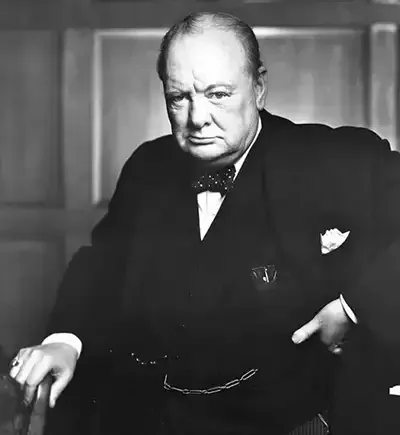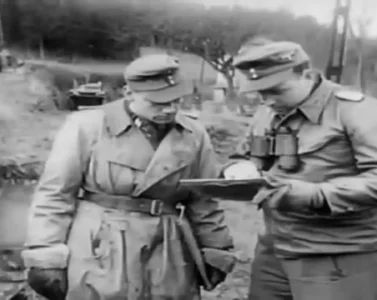- Military History
- Biographies
- Politicians Biographies
- Sir Winston Leonard Spencer Churchill
Sir Winston Leonard Spencer Churchill
Britain's great and inspiring World War II leader - a principal architect of the Allied war strategy
Winston Churchill was the son of Lord Randolph Churchill, descended from the First Duke of Marlborough and Jennie Jerome (an American). Young Churchill did not take well to schooling (at Harrow) and rejected the university education that befitted his aristocratic station. Instead, he enrolled at Sandhurst (the "British West Point") graduating in 1894 and receiving a commission in the Fourth Hussars.
He took a two-month leave in 1895 to cover unrest in Cuba as a war correspondent, then returned to his regiment and was dispatched to India, where he served in the Malakand expedition to the Northwest Frontier during 1897. He also continued to write as a correspondent and published the first of his many distinguished books, “The Malakand Field Force”.
In 1898, serving in Lord Horatio Kitchener's expedition into the Sudan he rode in the charge of the Twenty-First Lancers at the Battle of Omdurman and afterwards published a two-volume account of the Sudanese experience in “The River War (1899)”.
Early in 1899, Churchill resigned his commission to enter politics. After losing his first bid to enter Parliament, he sailed to South Africa on assignment from The Morning Post to cover the Second (Great) Boer War. He was taken captive by the Boers but pulled off a daring escape that catapulted him to world celebrity and improved his popular political standing.
In 1900, they elected Churchill to Parliament as a Conservative and quickly made a mark as an eloquent debater. However, he soon abandoned the Conservative cause and by 1904 had declared himself a Liberal. His new party came to power the following year, and they named Churchill under-secretary of state for the colonies. The Cabinet made him a member in 1908, as president of the Board of Trade, and two years later appointed him home secretary. In 1911, they appointed him first lord of the Admiralty. It was in this post that Churchill first truly excelled, collaborating with Admiral Lord Fisher of Kilverstone to modernize the Royal Navy and prepare it for what Churchill correctly saw as the coming world war.
At the commencement of World War I, Churchill's confidence in the navy he had helped to create was unbounded. He planned an audacious amphibious assault on the Dardanelles to aid the Russian war effort in 1915. The attack failed disastrously, as did the subsequent associated land campaign at Gallipoli bringing about Churchill's removal as first lord of the Admiralty and ultimately from the government altogether.
Churchill served briefly in the field in France, then rejoined the government under Prime Minister David Lloyd George as minister of munitions (July 1917 to December 1918) and was responsible not only for increasing the production of guns, but for promoting the development and manufacture of the tank - at the time a most ungainly instrument of war, but one for which Churchill saw an important future.
After leaving Munitions, Churchill became secretary of state for war and air during 1918-21, then secretary of state for the colonies (1921-22). In this latter capacity he negotiated important treaties in the Middle East and hammered out the 1921 agreement creating the Irish Free State. Despite these triumphs Churchill lost his office as well as his seat in Parliament after Lloyd George's government fell in 1922.
Following the collapse of Lloyd George's government, Churchill realigned himself with the Conservatives and was returned to Parliament in 1924, joining the cabinet of Prime Minister Stanley Baldwin as Chancellor of the Exchequer from 1924 to 1929. His tenure proved disastrous as his return of the nation to the gold standard in 1925 deepened the depression that had been brought on by the war. When economic hardship triggered a "General Strike" in 1926, Churchill vigorously condemned the strikers, creating a breach with labor that was never healed.
For a decade (1929-39), after he stepped down as exchequer, Churchill held no government office and became a vehement critic of Baldwin's pro-independence policy for India. He was equally adamant during this period about the developing situation in Nazi Germany, which he warned would once again bring the world to war.
He advocated putting Britain on a war footing and matching Germany's growing air power. He rightly predicted that the Germans would attack Britain by air to bring it to its knees and make it ripe for invasion.
Churchill's outrage at the folly of Prime Minister Neville Chamberlain's policy of "appeasing" Adolf Hitler's expansionist ambitions by allowing him to annex the Sudetenland in Czechoslovakia was unbounded. When Chamberlain returned from the Munich Conference (29th to 30th of September 1938) having reached this agreement and claiming to have achieved "peace in our time," Churchill branded the action "total and unmitigated defeat".
Events, of course, proved him right. After Hitler's invasion of Poland brought general war in September 1939, Chamberlain offered Churchill his former post of first lord of the Admiralty. In his characteristically aggressive manner, Churchill advocated an assault on Norway to dislodge the Germans there. The invasion proved abortive and disastrous, recalling the ill-fated Gallipoli campaign of World War I. Chamberlain resigned and Churchill replaced him as prime minister during the darkest period of the war.
The darkest period proved to be Winston Churchill's finest hour. As prime minister, he assumed all the responsibilities of a war leader. With Europe rapidly falling to the Germans he turned to the United States, establishing an intensely personal relationship with President Franklin D. Rooseveltwhich led to the supposedly neutral United States supplying Britain with arms and through a policy of "lend-lease" ships.
The German Luftwaffe nearly annihilated the British army at Dunkirk in June 1940. Later in the summer, the Battle of Britain begun as the German Luftwaffe (air force) unleashed a reign of terror over England's skies. Britons prepared to be invaded.
Through it all, Winston Churchill maintained his courage and fired the courage and determination of his people. The Battle of Britain was won by the Royal Air Force (RAF) who defeated the Luftwaffe and starved off invasion. In the meantime, Churchill refused to allow Hitler to tie down his forces defensively. He diverted an entire armored division (one of two in Britain) to fight Hitler's armies in the Middle East. He struck an alliance with the Soviet Union, aiding it after Germany invaded it, even though he was an implacable enemy of Communism.
With the entry of the United States into the war following the Japanese attack on Pearl Harbor (7th December 1941), Churchill helped to forge a three-way alliance among the U.S., U.S.S.R. and Britain.
Churchill's controversial war strategy - often debated among the three Allies - was to avoid invading the European mainland until what he called the "soft underbelly of Europe" had been breached by clearing North Africa and the Mediterranean of the enemy.
It was not until the summer of 1943 that the Allies invaded Sicily and Italy, having fought the first part of the "European" war in northern Africa. A year later, Churchill helped to plan and supporting the Normandy invasion ("D-Day" beginning on the 6th of June 1944).
While Churchill's overall "soft underbelly" strategy governed much of the war, his influence was diminished following the Normandy campaign. With victory in sight, he advocated a drive by the Western Allies (Britain and the United States) into Berlin in order to prevent Soviet occupation. Already here Churchill perceived the shape of a postwar "Cold War" world. But his strategy was overruled by Allied commander-in-chief Dwight D. Eisenhower, who believed it necessary first to crush the last German resistance in the West. Later, in a speech delivered at a small college in Missouri, Churchill would coin the phrase "iron curtain" to describe the pall of Soviet influence and tyranny that had descended across eastern Europe.
In some ways disappointed by the final conditions of the Allied victory, Churchill received a crushing blow in July 1945 when a general election failed to return him to office following the unconditional surrender of Germany but just before the capitulation of Japan. Yet Churchill refused to be crushed. He received the first miserable election returns while taking a bath: "There may well be a landslide and they have a perfect right to kick us out," he remarked. "That is democracy. That is what we have been fighting for. Hand me my towel."
Churchill returned to office in 1951, was knighted but in July 1953 suffered a stroke. Despite his illness, Churchill stayed in office until April 1955, when he chose Anthony Eden to take over. Churchill spent his last decade pursuing his favorite hobby, painting and seeing to the publication of the last of his great literary works, the four-volume “History of the English-Speaking Peoples (1956-58)”.
Indeed, the Prime Ministers substantial body of biographical and historical writings (including a six-volume history of World War II, published during 1948-54) earned him the Nobel Prize for literature in 1953.
Despite poor health, Churchill still tried to remain active in public life but on the 15th of January 1965 Churchill suffered a severe stroke and died at his London home nine days later, aged 90, on the morning of Sunday, 24 January 1965 (70 years to the day after his own father's death).
Sir Winston Leonard Spencer – Churchill, Military Ranks
- Cornet, 4th Queen's Own Hussars (20 February 1895)
- Lieutenant, 4th Queen's Own Hussars (20 May 1896)
- Lieutenant, South African Light Horse (January 1900)
- Captain, Queen's Own Oxfordshire Hussars, Imperial Yeomanry (4 January 1902)
- Major, Henley Squadron, Queen's Own Oxfordshire Hussars (5 May 1905)
- Major, 2nd Battalion, Grenadier Guards (November 1915)
- Lieutenant-Colonel (temporary), 6th Battalion, Royal Scots Fusiliers (5 January 1916 – March 1916)
- Major, Territorial Army (March 1916 – 1924)
- Honorary Air Commodore of No. 615 Squadron RAF (1939–1957)
- Colonel, 4th Queen's Own Hussars (22 October 1941 – 1958)
- Colonel, Queen's Royal Irish Hussars (1958–1965)
- Honorary Colonel, Queen's Own Oxfordshire Hussars
- Honorary Colonel, Royal Artillery, Territorial Army (21 October 1939 – 1965)
- Honorary Colonel, 6th Battalion, Royal Scots Fusiliers (24 January 1940)
- Honorary Colonel, 4th/5th (Cinque Ports) Battalion, Royal Sussex Regiment (24 January 1940)
- Major, Territorial Army, Retired (20 February 1942)
- Honorary Colonel, 489th (Cinque Ports) Heavy Anti-Aircraft Regiment, RA, Territorial Army (1947–1955)
- Honorary Pilot Wings, United States Air Force
- Colonel, Honorable Order of Kentucky Colonels
Sir Winston Leonard Spencer – Churchill, Political and Government Offices
- Member of Parliament (1901–1922, 1924–1964)
- Under Secretary of State for the Colonies (1905–1908)
- Privy Counsellor (1907–1965)
- President of the Board of Trade (1908–1910)
- Home Secretary (1910–1911)
- First Lord of the Admiralty (1911–1915, 1939–1940)
- Chancellor of the Duchy of Lancaster (1915)
- Minister of Munitions (1917–1919)
- Secretary of State for War and Secretary of State for Air (1919–1922)
- Chancellor of the Exchequer (1924–1929)
- Prime Minister of the United Kingdom (1940–1945, 1951–1955)
- Lord Warden of the Cinque Ports (1941–1965)
- King's Privy Council for Canada (29 December 1941)
- Leader of the Opposition (1945–1951)
- Father of the House of Commons (1959–1964)
Sir Winston Leonard Spencer Churchill - Quick Facts
- Army Reserve (British Army)
- British Army
- Royal Scots Fusiliers (British Army)
- Mahdist War (1881-1899)
- Second Boer War (11 October 1899 – 31 May 1902)
- WWI (1914-1918)
- WWII (1939-1945)
- {{#owner}}
- {{#url}} {{#avatarSrc}}
{{name}} {{/url}} {{^url}} {{#avatar}} {{& avatar}} {{/avatar}} {{name}} {{/url}} - {{/owner}} {{#created}}
- {{created}} {{/created}}
























